Bass Sheet Music
 "Please write music like Wagner, only louder." Samuel Goldwyn
"Please write music like Wagner, only louder." Samuel Goldwyn
Kanye West

Kanye Omari West (born June 8, 1977) is a 9 time Grammy Award-winning American rapper and record producer. He released his debut album The College Dropout in 2004, his second album Late Registration in 2005, and his third album Graduation in 2007. His first three albums have received numerous awards, critical acclaim, and commercial success. West also runs his own record label GOOD Music. West's mascot and trademark is "Dropout Bear," a teddy bear which has appeared on the covers of his three albums as well as the singles "Stronger" and "Homecoming."
West's parents divorced when he was three years old, and he and his mother moved to Chicago, Illinois. He enrolled at Chicago State University but later dropped out to continue pursuing his music career. He later gained fame by producing hit singles for musical artists including Jay-Z, Alicia Keys, and Janet Jackson. West's style of production often utilizes pitched-up vocal samples, usually from soul songs, with his own drums and instruments. Some controversy has also surrounded West, such as an incident during a live telecast of a benefit concert for Hurricane Katrina relief, when he deviated from the script and told the audience, "George Bush doesn't care about black people."
On May 16, 2008, Kanye West was crowned by MTV as the year's #1 "Hottest MC In The Game."
West's parents divorced when he was three years old, and he and his mother moved to Chicago, Illinois. He enrolled at Chicago State University but later dropped out to continue pursuing his music career. He later gained fame by producing hit singles for musical artists including Jay-Z, Alicia Keys, and Janet Jackson. West's style of production often utilizes pitched-up vocal samples, usually from soul songs, with his own drums and instruments. Some controversy has also surrounded West, such as an incident during a live telecast of a benefit concert for Hurricane Katrina relief, when he deviated from the script and told the audience, "George Bush doesn't care about black people."
On May 16, 2008, Kanye West was crowned by MTV as the year's #1 "Hottest MC In The Game."
Astor Piazzolla

Ástor Pantaleón Piazzolla (March 11, 1921 – July 4, 1992) was an Argentine tango composer and bandoneón player. His oeuvre revolutionized the traditional tango into a new style termed nuevo tango, incorporating elements from jazz and classical music. An excellent bandoneonist, he regularly performed his own compositions with different ensembles.
Piazzolla's nuevo tango was distinct from the traditional tango in its incorporation of elements of jazz, its use of extended harmonies and dissonance, its use of counterpoint, and its ventures into extended compositional forms. As Argentine psychoanalyst Carlos Kuri has pointed out, Piazzolla's fusion of tango with this wide range of other recognizable Western musical elements was so successful that it produced a new individual style transcending these influences. It is precisely this success, and individuality, that makes it hard to pin down where particular influences reside in his compositions, but some aspects are clear. The use of the passacaglia technique of a circulating bass line and harmonic sequence, invented and much used in 17th and 18th century baroque music but also central to the idea of jazz "changes", predominates in most of Piazzolla's mature compositions. Another clear reference to the baroque is the often complex and virtuosic counterpoint that sometimes follows strict fugal behavior but more often simply allows each performer in the group to assert his voice. A further technique that emphasises this sense of democracy and freedom among the musicians is improvisation that is borrowed from jazz in concept, but in practice involves a different vocabulary of scales and rhythms that stay within the parameters of the established tango sound-world. Pablo Ziegler has been particularly responsible for developing this aspect of the style both within Piazzolla's groups and since the composer's death.
Piazzolla's nuevo tango was distinct from the traditional tango in its incorporation of elements of jazz, its use of extended harmonies and dissonance, its use of counterpoint, and its ventures into extended compositional forms. As Argentine psychoanalyst Carlos Kuri has pointed out, Piazzolla's fusion of tango with this wide range of other recognizable Western musical elements was so successful that it produced a new individual style transcending these influences. It is precisely this success, and individuality, that makes it hard to pin down where particular influences reside in his compositions, but some aspects are clear. The use of the passacaglia technique of a circulating bass line and harmonic sequence, invented and much used in 17th and 18th century baroque music but also central to the idea of jazz "changes", predominates in most of Piazzolla's mature compositions. Another clear reference to the baroque is the often complex and virtuosic counterpoint that sometimes follows strict fugal behavior but more often simply allows each performer in the group to assert his voice. A further technique that emphasises this sense of democracy and freedom among the musicians is improvisation that is borrowed from jazz in concept, but in practice involves a different vocabulary of scales and rhythms that stay within the parameters of the established tango sound-world. Pablo Ziegler has been particularly responsible for developing this aspect of the style both within Piazzolla's groups and since the composer's death.
Mozart

Wolfgang Amadeus Mozart, full name Johann Chrysostom Wolfgang Amadeus Mozart (27 January 1756 â 5 December 1791) was a prolific and influential composer of the Classical era. His over 600 compositions include works widely acknowledged as pinnacles of symphonic, concertante, chamber, piano, operatic, and choral music. Mozart is among the most enduringly popular of classical composers, and many of his works are part of the standard concert repertoire.
Mozart's music, like Haydn's, stands as an archetypal example of the Classical style. His works spanned the period during which that style transformed from one exemplified by the style galant to one that began to incorporate some of the contrapuntal complexities of the late Baroque, complexities against which the galant style had been a reaction. Mozart's own stylistic development closely paralleled the development of the classical style as a whole. In addition, he was a versatile composer and wrote in almost every major genre, including symphony, opera, the solo concerto, chamber music including string quartet and string quintet, and the piano sonata. While none of these genres were new, the piano concerto was almost single-handedly developed and popularized by Mozart. He also wrote a great deal of religious music, including masses; and he composed many dances, divertimenti, serenades, and other forms of light entertainment.
The central traits of the classical style can be identified in Mozart's music. Clarity, balance, and transparency are hallmarks of his work.
Mozart's music, like Haydn's, stands as an archetypal example of the Classical style. His works spanned the period during which that style transformed from one exemplified by the style galant to one that began to incorporate some of the contrapuntal complexities of the late Baroque, complexities against which the galant style had been a reaction. Mozart's own stylistic development closely paralleled the development of the classical style as a whole. In addition, he was a versatile composer and wrote in almost every major genre, including symphony, opera, the solo concerto, chamber music including string quartet and string quintet, and the piano sonata. While none of these genres were new, the piano concerto was almost single-handedly developed and popularized by Mozart. He also wrote a great deal of religious music, including masses; and he composed many dances, divertimenti, serenades, and other forms of light entertainment.
The central traits of the classical style can be identified in Mozart's music. Clarity, balance, and transparency are hallmarks of his work.
Leopold Mozart
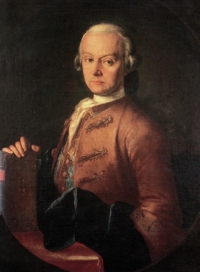
Johann Georg Leopold Mozart (November 14, 1719 – May 28, 1787) was a composer, conductor, teacher, and violinist. He is best known today as the father and teacher of Wolfgang Amadeus Mozart, and for his violin textbook Versuch einer gründlichen Violinschule.
Leopold Mozart's music is inevitably overshadowed by the work of his son Wolfgang, and in any case the father willingly sacrificed his own career to promote his son's. But Leopold's Cassation in G for Orchestra and Toys (Toy Symphony), once attributed to Joseph Haydn, remains popular, and a number of symphonies, a trumpet concerto, and other works also survive. He was much concerned with a naturalistic feel to his compositions, his Jagdsinfonie (or Sinfonia da Caccia for four horns and strings) calls for dogs and shotguns, and his Bauernhochzeit (Peasant Wedding) includes bagpipes, hurdy-gurdy, a dulcimer, whoops and whistles (ad. lib.), and pistol shots.
His oeuvre was extensive, but it has only been until recently that scholars have begun to assess the scope or the quality of it; much is lost and it is not known how representative the surviving works are of his overall output. Cliff Eisen, who wrote a doctoral dissertation on Leopold Mozart's symphonies, finds in a Symphony in G major examples of his "sensitivity to orchestral colour" and a work that "compares favourably with those of virtually any of Mozart’s immediate contemporaries."
Leopold Mozart's music is inevitably overshadowed by the work of his son Wolfgang, and in any case the father willingly sacrificed his own career to promote his son's. But Leopold's Cassation in G for Orchestra and Toys (Toy Symphony), once attributed to Joseph Haydn, remains popular, and a number of symphonies, a trumpet concerto, and other works also survive. He was much concerned with a naturalistic feel to his compositions, his Jagdsinfonie (or Sinfonia da Caccia for four horns and strings) calls for dogs and shotguns, and his Bauernhochzeit (Peasant Wedding) includes bagpipes, hurdy-gurdy, a dulcimer, whoops and whistles (ad. lib.), and pistol shots.
His oeuvre was extensive, but it has only been until recently that scholars have begun to assess the scope or the quality of it; much is lost and it is not known how representative the surviving works are of his overall output. Cliff Eisen, who wrote a doctoral dissertation on Leopold Mozart's symphonies, finds in a Symphony in G major examples of his "sensitivity to orchestral colour" and a work that "compares favourably with those of virtually any of Mozart’s immediate contemporaries."
Genesis
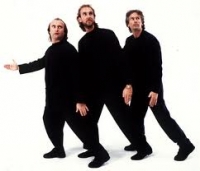
Genesis are an English rock band that formed in 1967. The band currently comprises the longest-tenured members Phil Collins, Mike Rutherford and Tony Banks. Past members Peter Gabriel, Anthony Phillips and Steve Hackett also played major roles in the band in its early years. Genesis are among the top 30 highest-selling recording artists of all time with approximately 150 million albums sold worldwide.
AC/DC
AC/DC are an Australian rock band formed in 1973 by brothers Malcolm and Angus Young. Although the band are commonly classified as hard rock and are considered a pioneer of heavy metal, they have always classified their music as rock and roll.
AC/DC underwent several line-up changes before releasing their first album, High Voltage, in 1975. Membership remained stable until bassist Mark Evans was replaced by Cliff Williams in 1977. The band recorded their highly successful album Highway to Hell in 1979. Lead singer and co-songwriter Bon Scott died on 19 February 1980, after a night of heavy alcohol consumption. The group briefly considered disbanding, but soon ex-Geordie singer Brian Johnson was selected to replace Scott. Later that year, the band released their best-selling album, Back in Black.
The band's next album, For Those About to Rock We Salute You, was their first album to reach number one in the United States. AC/DC declined in popularity soon after drummer Phil Rudd was fired in 1983 and was replaced by future Dio drummer Simon Wright, though the band resurged in the early 1990s with the release of The Razor's Edge. Phil Rudd returned in 1994 (after Chris Slade was asked to leave in favour of him) and contributed to the band's 1995 album Ballbreaker. Stiff Upper Lip was released in 2000 and was well received by critics. The band's most recent album, Black Ice, was released on 20 October 2008.
As of 2008, AC/DC have sold more than 200 million albums worldwide, including 71 million albums in the United States. Back in Black has sold an estimated 45 million units worldwide, making it the highest-selling album by any band and the 2nd highest-selling album in history, behind "Thriller" by Michael Jackson. The album has sold 22 million in the US alone, where it is the fifth-highest-selling album. AC/DC ranked fourth on VH1's list of the "100 Greatest Artists of Hard Rock" and was named the seventh "Greatest Heavy Metal Band of All Time" by MTV. In 2004, the band was ranked number 72 in the Rolling Stone list of the "100 Greatest Artists of All Time".
AC/DC underwent several line-up changes before releasing their first album, High Voltage, in 1975. Membership remained stable until bassist Mark Evans was replaced by Cliff Williams in 1977. The band recorded their highly successful album Highway to Hell in 1979. Lead singer and co-songwriter Bon Scott died on 19 February 1980, after a night of heavy alcohol consumption. The group briefly considered disbanding, but soon ex-Geordie singer Brian Johnson was selected to replace Scott. Later that year, the band released their best-selling album, Back in Black.
The band's next album, For Those About to Rock We Salute You, was their first album to reach number one in the United States. AC/DC declined in popularity soon after drummer Phil Rudd was fired in 1983 and was replaced by future Dio drummer Simon Wright, though the band resurged in the early 1990s with the release of The Razor's Edge. Phil Rudd returned in 1994 (after Chris Slade was asked to leave in favour of him) and contributed to the band's 1995 album Ballbreaker. Stiff Upper Lip was released in 2000 and was well received by critics. The band's most recent album, Black Ice, was released on 20 October 2008.
As of 2008, AC/DC have sold more than 200 million albums worldwide, including 71 million albums in the United States. Back in Black has sold an estimated 45 million units worldwide, making it the highest-selling album by any band and the 2nd highest-selling album in history, behind "Thriller" by Michael Jackson. The album has sold 22 million in the US alone, where it is the fifth-highest-selling album. AC/DC ranked fourth on VH1's list of the "100 Greatest Artists of Hard Rock" and was named the seventh "Greatest Heavy Metal Band of All Time" by MTV. In 2004, the band was ranked number 72 in the Rolling Stone list of the "100 Greatest Artists of All Time".
Antonin Dvorak

Antonín Leopold Dvořák (English pronunciation: /ˈdvɒrʒɑːk/ DVOR-zhahk or /ˈdvɒrʒæk/ DVOR-zhak; Czech: ( listen); September 8, 1841 – May 1, 1904) was a Czech composer of Romantic music, who employed the idioms of the folk music of Moravia and his native Bohemia. His works include operas, symphonic, choral and chamber music. His best-known works include his New World Symphony, the Slavonic Dances, "American" String Quartet, and Cello Concerto in B minor.
Dvořák wrote in a variety of forms: his nine symphonies generally stick to classical models that Beethoven would have recognised, but he also worked in the newly developed symphonic poem form and the influence of Richard Wagner is apparent in some works. Many of his works also show the influence of Czech folk music, both in terms of rhythms and melodic shapes; perhaps the best known examples are the two sets of Slavonic Dances. Dvořák also wrote operas (of which the best known is Rusalka); serenades for string orchestra and wind ensemble; chamber music (including a number of string quartets, and quintets); songs; choral music; and piano music.
Dvořák wrote in a variety of forms: his nine symphonies generally stick to classical models that Beethoven would have recognised, but he also worked in the newly developed symphonic poem form and the influence of Richard Wagner is apparent in some works. Many of his works also show the influence of Czech folk music, both in terms of rhythms and melodic shapes; perhaps the best known examples are the two sets of Slavonic Dances. Dvořák also wrote operas (of which the best known is Rusalka); serenades for string orchestra and wind ensemble; chamber music (including a number of string quartets, and quintets); songs; choral music; and piano music.
Carlos Gardel

Carlos Gardel (11 December 1890 – 24 June 1935) was a singer, songwriter and actor, and is perhaps the most prominent figure in the history of tango. The unerring musicality of Gardel's baritone voice and the dramatic phrasing of his lyrics made miniature masterpieces of his hundreds of three-minute tango recordings. Together with lyricist and long-time collaborator Alfredo Le Pera, Gardel wrote several classic tangos, most notably "Mi Buenos Aires querido", "Por una cabeza" and "El día que me quieras".
Gardel died in an airplane crash at the height of his career, becoming an archetypal tragic hero mourned throughout Latin America. For many, Gardel embodies the soul of the tango style. He is commonly referred to as "Carlitos", "El Zorzal" (The Song Thrush), "The King of Tango", "El Mago" (The Magician) and "El Mudo" (The Mute).
Gardel died in an airplane crash at the height of his career, becoming an archetypal tragic hero mourned throughout Latin America. For many, Gardel embodies the soul of the tango style. He is commonly referred to as "Carlitos", "El Zorzal" (The Song Thrush), "The King of Tango", "El Mago" (The Magician) and "El Mudo" (The Mute).
Jamiroquai

Jamiroquai is a Grammy Award-winning English acid jazz/funk/soul band. Jamiroquai was initially the most prominent component in the early-1990s London-based acid jazz movement, alongside groups such as Incognito, the Brand New Heavies, Galliano, and Corduroy. Subsequent albums have explored other musical directions such as, but not limited to, pop, rock and electronica. Jamiroquai has sold over 2.5 million records in the United States alone and over 21 million records all over the world.
The band name is a blend of Jam session and "iroquai", based on the Iroquois, a Native American tribe. The lineup of the band has changed several times, and the longest serving and now core members of the band are lead singer and songwriter Jason "Jay" Kay and drummer Derrick McKenzie (1994). Despite his self-professed attempts to treat Jamiroquai as a band, Kay has always been at the forefront of how the group is marketed, and has therefore always had the lion's share of media attention, to the point where he is viewed as almost a solo artist. He was the impetus behind the formation of Jamiroquai, deciding to form the band after an unsuccessful audition to become the singer of the Brand New Heavies.
The band name is a blend of Jam session and "iroquai", based on the Iroquois, a Native American tribe. The lineup of the band has changed several times, and the longest serving and now core members of the band are lead singer and songwriter Jason "Jay" Kay and drummer Derrick McKenzie (1994). Despite his self-professed attempts to treat Jamiroquai as a band, Kay has always been at the forefront of how the group is marketed, and has therefore always had the lion's share of media attention, to the point where he is viewed as almost a solo artist. He was the impetus behind the formation of Jamiroquai, deciding to form the band after an unsuccessful audition to become the singer of the Brand New Heavies.
Avenged Sevenfold

Avenged Sevenfold is an American rock band from Huntington Beach, California, formed in 1999. The band has achieved mainstream success with their 2005 album City of Evil, which included singles such as "Burn It Down", "Bat Country," "Beast and the Harlot" and "Seize the Day." The band's success followed with their self-titled album, with singles such as "Critical Acclaim", "Almost Easy", "Afterlife", "Scream" and "Dear God".
Stevie Wonder

Stevie Wonder (born Stevland Hardaway Judkins on May 13, 1950, name later changed to Stevland Hardaway Morris) is an American singer-songwriter, multi-instrumentalist, and record producer. A prominent figure in popular music during the latter half of the 20th century , Wonder has recorded more than thirty top ten hits, won 26 Grammy Awards (a record for a solo artist), plus one for lifetime achievement, won an Academy Award for Best Song and been inducted into both the Rock and Roll and Songwriters halls of fame. He has also been awarded the Polar Music Prize.
Blind from infancy, Wonder signed with Motown Records as a pre-adolescent at age twelve, and continues to perform and record for the label to this day. He has nine U.S. number-one hits to his name (on the pop Charts, 20 U.S. R&B number one hits), and album sales totaling more than 150 million units. Wonder has recorded several critically acclaimed albums and hit singles, and writes and produces songs for many of his label mates and outside artists as well. Wonder plays the piano, synthesizer, harmonica, congas, drums, bongos, organ, melodica, and clavinet. In his early career, he was best known for his harmonica work, but today he is better known for his keyboard skills and vocals.
Blind from infancy, Wonder signed with Motown Records as a pre-adolescent at age twelve, and continues to perform and record for the label to this day. He has nine U.S. number-one hits to his name (on the pop Charts, 20 U.S. R&B number one hits), and album sales totaling more than 150 million units. Wonder has recorded several critically acclaimed albums and hit singles, and writes and produces songs for many of his label mates and outside artists as well. Wonder plays the piano, synthesizer, harmonica, congas, drums, bongos, organ, melodica, and clavinet. In his early career, he was best known for his harmonica work, but today he is better known for his keyboard skills and vocals.
Prokofiev

Sergei Sergeyevich Prokofiev (Russian: Сергей Сергеевич Прокофьев; Ukrainian: Сергій Сергійович Прокоф'єв) (27 April 1891 – 5 March 1953) was a Russian composer, pianist and conductor who mastered numerous musical genres and came to be admired as one of the greatest composers of the 20th century.
Prokofiev was a soloist with the London Symphony Orchestra, conducted by Piero Coppola, in the first recording of his Piano Concerto No. 3, recorded in London by His Master's Voice in June 1932. Prokofiev also recorded some of his solo piano music for HMV in Paris in February 1935; these recordings were issued on CD by Pearl and Naxos. In 1938, he conducted the Moscow Philharmonic Orchestra in a recording of the second suite from his Romeo and Juliet ballet; this performance was also later released on LP and CD. Another reported recording with Prokofiev and the Moscow Philharmonic was of the First Violin Concerto with David Oistrakh as soloist; Everest Records later released this recording on an LP.
Prokofiev was a soloist with the London Symphony Orchestra, conducted by Piero Coppola, in the first recording of his Piano Concerto No. 3, recorded in London by His Master's Voice in June 1932. Prokofiev also recorded some of his solo piano music for HMV in Paris in February 1935; these recordings were issued on CD by Pearl and Naxos. In 1938, he conducted the Moscow Philharmonic Orchestra in a recording of the second suite from his Romeo and Juliet ballet; this performance was also later released on LP and CD. Another reported recording with Prokofiev and the Moscow Philharmonic was of the First Violin Concerto with David Oistrakh as soloist; Everest Records later released this recording on an LP.
Ravel

Joseph-Maurice Ravel (March 7, 1875 – December 28, 1937) was a French composer of Impressionist music known especially for his melodies, orchestral and instrumental textures and effects. Much of his piano music, chamber music, vocal music and orchestral music has entered the standard concert repertoire.
Ravel's piano compositions, such as Jeux d'eau, Miroirs and Gaspard de la Nuit, demand considerable virtuosity from the performer, and his orchestral music, including Daphnis et Chloé and his arrangement of Modest Mussorgsky's Pictures at an Exhibition, uses a variety of sound and instrumentation very effectively.
Ravel is perhaps known best for his orchestral work, Boléro (1928), which he considered trivial and once described as "a piece for orchestra without music."
According to SACEM, Ravel's estate earns more royalties than that of any other French musician. According to international copyright law, Ravel's works are public domain since January 1, 2008 in most countries. In France, due to anomalous copyright law extensions to account for the two world wars, they will not enter the public domain until 2015.
Ravel's piano compositions, such as Jeux d'eau, Miroirs and Gaspard de la Nuit, demand considerable virtuosity from the performer, and his orchestral music, including Daphnis et Chloé and his arrangement of Modest Mussorgsky's Pictures at an Exhibition, uses a variety of sound and instrumentation very effectively.
Ravel is perhaps known best for his orchestral work, Boléro (1928), which he considered trivial and once described as "a piece for orchestra without music."
According to SACEM, Ravel's estate earns more royalties than that of any other French musician. According to international copyright law, Ravel's works are public domain since January 1, 2008 in most countries. In France, due to anomalous copyright law extensions to account for the two world wars, they will not enter the public domain until 2015.
Rihanna

Rihanna (born Robyn Rihanna Fenty; February 20, 1988) is a Barbadian singer, model and fashion designer. She is the second artist, and first female, from Barbados to have received a Grammy Award (the first being Jimmy Senya Haynes). Rihanna is currently signed to the Def Jam Recordings label. She has attained four Billboard Hot 100 number ones thus far ("SOS", "Umbrella", "Take a Bow", and "Disturbia"), tying her with Mariah Carey and Beyoncé as the female solo artist with the most number ones this decade.
Rihanna came to fame in 2005 with the release of her debut album Music of the Sun, which featured her breakthrough single "Pon de Replay". Less than a year later, Rihanna released A Girl Like Me and gave her first number one single, "SOS". In 2007, Rihanna released her third studio album, Good Girl Gone Bad. The album has yielded six hit singles including five worldwide number one singles "Umbrella", "Don't Stop the Music" and "Take A Bow". Since the release of her debut album, Rihanna has amassed eleven top 40 hit singles in the U.S.
Rihanna came to fame in 2005 with the release of her debut album Music of the Sun, which featured her breakthrough single "Pon de Replay". Less than a year later, Rihanna released A Girl Like Me and gave her first number one single, "SOS". In 2007, Rihanna released her third studio album, Good Girl Gone Bad. The album has yielded six hit singles including five worldwide number one singles "Umbrella", "Don't Stop the Music" and "Take A Bow". Since the release of her debut album, Rihanna has amassed eleven top 40 hit singles in the U.S.
Kenny Wheeler
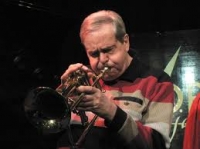
Kenneth Vincent John Wheeler, OC (14 January 1930 – 18 September 2014) was a Canadian composer and trumpet and flugelhorn player, based in the U.K. from the 1950s onwards.
Most of his performances were rooted in jazz, but he was also active in free improvisation and occasionally contributed to rock music recordings. Wheeler wrote over one hundred compositions and was a skilled arranger for small groups and large ensembles.
Wheeler was the patron of the Royal Academy Junior Jazz course
Most of his performances were rooted in jazz, but he was also active in free improvisation and occasionally contributed to rock music recordings. Wheeler wrote over one hundred compositions and was a skilled arranger for small groups and large ensembles.
Wheeler was the patron of the Royal Academy Junior Jazz course
Trevor Jones
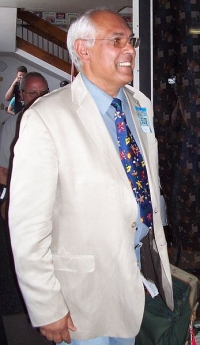
Trevor Alfred Charles Jones (born 23 March 1949 in Cape Town, South Africa) is a South African orchestral film score composer. Although not especially well known outside the film world, he has composed for numerous films and his music has been critically acclaimed for both its depth and emotion.
Earth Wind & Fire
Earth, Wind & Fire (abbreviated as EW&F or simply EWF) is an American band that has spanned the musical genres of R&B, soul, funk, jazz, disco, pop, rock, dance, Latin, and Afro pop. They have been described as one of the most innovative and commercially successful acts of all time. Rolling Stone called them "innovative, precise yet sensual, calculated yet galvanizing" and declared that the band "changed the sound of black pop". VH1 has also described EWF as "one of the greatest bands" ever.
Jonathan Coulton
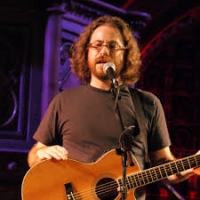
Jonathan Coulton, often called "JoCo" by fans, is an American singer-songwriter, known for his songs about geek culture and his use of the Internet to draw fans. Among his most popular songs are "Code Monkey", "Re: Your Brains", "Still Alive" and "Want You Gone".
Duke Ellington

Edward Kennedy "Duke" Ellington (April 29, 1899 â May 24, 1974) was an American composer, pianist, and bandleader.
Recognized during his life as one of the most influential figures in jazz, if not in all American music, Ellington's reputation has increased since his death, including a special award citation from the Pulitzer Prize Board.
Ellington called his style and sound "American Music" rather than jazz, and liked to describe those who impressed him as "beyond category", including many of the musicians who served with his orchestra, some of whom were themselves considered among the giants of jazz and remained with Ellington's orchestra for decades. While many were noteworthy in their own right, it was Ellington that melded them into one of the most well-known orchestral units in the history of jazz. He often composed specifically for the style and skills of these individuals, such as "Jeep's Blues" for Johnny Hodges, "Concerto for Cootie" ("Do Nothing Till You Hear from Me") for Cootie Williams and "The Mooche" for Tricky Sam Nanton. He also recorded songs written by his bandsmen, such as Juan Tizol's "Caravan" and "Perdido" which brought the "Spanish Tinge" to big-band jazz. After 1941, he frequently collaborated with composer-arranger Billy Strayhorn, who he called his alter-ego.
One of the twentieth century's best-known African-American celebrities, Ellington recorded for many American record companies, and appeared in several films. Ellington and his orchestra toured the United States and Europe regularly before and after World War II. Ellington led his band from 1923 until his death in 1974. His son Mercer Ellington took over the band until his death from cancer in 1996. Paul Ellington, Mercer's youngest son, took over the Orchestra from there and after his mother's passing took over the Estate of Duke and Mercer Ellington.
Recognized during his life as one of the most influential figures in jazz, if not in all American music, Ellington's reputation has increased since his death, including a special award citation from the Pulitzer Prize Board.
Ellington called his style and sound "American Music" rather than jazz, and liked to describe those who impressed him as "beyond category", including many of the musicians who served with his orchestra, some of whom were themselves considered among the giants of jazz and remained with Ellington's orchestra for decades. While many were noteworthy in their own right, it was Ellington that melded them into one of the most well-known orchestral units in the history of jazz. He often composed specifically for the style and skills of these individuals, such as "Jeep's Blues" for Johnny Hodges, "Concerto for Cootie" ("Do Nothing Till You Hear from Me") for Cootie Williams and "The Mooche" for Tricky Sam Nanton. He also recorded songs written by his bandsmen, such as Juan Tizol's "Caravan" and "Perdido" which brought the "Spanish Tinge" to big-band jazz. After 1941, he frequently collaborated with composer-arranger Billy Strayhorn, who he called his alter-ego.
One of the twentieth century's best-known African-American celebrities, Ellington recorded for many American record companies, and appeared in several films. Ellington and his orchestra toured the United States and Europe regularly before and after World War II. Ellington led his band from 1923 until his death in 1974. His son Mercer Ellington took over the band until his death from cancer in 1996. Paul Ellington, Mercer's youngest son, took over the Orchestra from there and after his mother's passing took over the Estate of Duke and Mercer Ellington.
Miles Davis

Miles Dewey Davis III (May 26, 1926 – September 28, 1991) was an American trumpeter, bandleader, and composer.
Widely considered one of the most influential musicians of the 20th century, Miles Davis was, with his musical groups, at the forefront of several major developments in jazz music, including bebop, cool jazz, hard bop, modal jazz, and jazz fusion. Many well-known musicians rose to prominence as members of Davis' ensembles, including saxophonists Gerry Mulligan, John Coltrane, Cannonball Adderley, George Coleman, Wayne Shorter, Dave Liebman, Branford Marsalis and Kenny Garrett; trombonist J. J. Johnson; pianists Horace Silver, Red Garland, Wynton Kelly, Bill Evans, Herbie Hancock, Joe Zawinul, Chick Corea, and Keith Jarrett; guitarists John McLaughlin, Pete Cosey, John Scofield and Mike Stern; bassists Paul Chambers, Ron Carter, Dave Holland, Marcus Miller and Darryl Jones ; and drummers Philly Joe Jones, Jimmy Cobb, Tony Williams, Billy Cobham, Jack DeJohnette, and Al Foster.
On October 7, 2008, his album Kind of Blue, released in 1959, received its fourth platinum certification from the RIAA, signifying sales of 4 million copies. Miles Davis was inducted into the Rock and Roll Hall of Fame in 2006. Davis was noted as "one of the key figures in the history of jazz".
On November 5, 2009, Rep. John Conyers of Michigan sponsored a measure in the US House of Representatives to recognize and commemorate the album Kind of Blue on its 50th anniversary. The measure also affirms jazz as a national treasure and "encourages the United States government to preserve and advance the art form of jazz music." It passed, unanimously, with a vote of 409–0 on December 15, 2009.
Widely considered one of the most influential musicians of the 20th century, Miles Davis was, with his musical groups, at the forefront of several major developments in jazz music, including bebop, cool jazz, hard bop, modal jazz, and jazz fusion. Many well-known musicians rose to prominence as members of Davis' ensembles, including saxophonists Gerry Mulligan, John Coltrane, Cannonball Adderley, George Coleman, Wayne Shorter, Dave Liebman, Branford Marsalis and Kenny Garrett; trombonist J. J. Johnson; pianists Horace Silver, Red Garland, Wynton Kelly, Bill Evans, Herbie Hancock, Joe Zawinul, Chick Corea, and Keith Jarrett; guitarists John McLaughlin, Pete Cosey, John Scofield and Mike Stern; bassists Paul Chambers, Ron Carter, Dave Holland, Marcus Miller and Darryl Jones ; and drummers Philly Joe Jones, Jimmy Cobb, Tony Williams, Billy Cobham, Jack DeJohnette, and Al Foster.
On October 7, 2008, his album Kind of Blue, released in 1959, received its fourth platinum certification from the RIAA, signifying sales of 4 million copies. Miles Davis was inducted into the Rock and Roll Hall of Fame in 2006. Davis was noted as "one of the key figures in the history of jazz".
On November 5, 2009, Rep. John Conyers of Michigan sponsored a measure in the US House of Representatives to recognize and commemorate the album Kind of Blue on its 50th anniversary. The measure also affirms jazz as a national treasure and "encourages the United States government to preserve and advance the art form of jazz music." It passed, unanimously, with a vote of 409–0 on December 15, 2009.
Vivaldi

Antonio Lucio Vivaldi (March 4, 1678 â July 28, 1741), nicknamed il Prete Rosso ("The Red Priest"), was a Venetian priest and Baroque music composer, as well as a famous virtuoso violinist; he was born and raised in the Republic of Venice. The Four Seasons, a series of four violin concerti, is his best-known work and a highly popular Baroque piece.
Many of Vivaldi's compositions reflect a flamboyant, almost playful, exuberance. Most of Vivaldi's repertoire was rediscovered only in the first half of the 20th century in Turin and Genoa and was published in the second half. Vivaldi's music is innovative, breaking a consolidated tradition in schemes; he gave brightness to the formal and the rhythmic structure of the concerto, repeatedly looking for harmonic contrasts and innovative melodies and themes. Moreover, Vivaldi was able to compose nonacademic music, particularly meant to be appreciated by the wide public and not only by an intellectual minority. The joyful appearance of his music reveals in this regard a transmissible joy of composing; these are among the causes of the vast popularity of his music. This popularity soon made him famous in other countries such as France which was, at the time, very independent concerning its musical taste.
Vivaldi is considered one of the composers who brought Baroque music (with its typical contrast among heavy sonorities) to evolve into a classical style. Johann Sebastian Bach was deeply influenced by Vivaldi's concertos and arias (recalled in his Johannes Passion, Matthäuspassion, and cantatas). Bach transcribed a number of Vivaldi's concerti for solo keyboard, along with a number for orchestra, including the famous Concerto for Four Violins and Violoncello, Strings and Continuo (RV 580).
Many of Vivaldi's compositions reflect a flamboyant, almost playful, exuberance. Most of Vivaldi's repertoire was rediscovered only in the first half of the 20th century in Turin and Genoa and was published in the second half. Vivaldi's music is innovative, breaking a consolidated tradition in schemes; he gave brightness to the formal and the rhythmic structure of the concerto, repeatedly looking for harmonic contrasts and innovative melodies and themes. Moreover, Vivaldi was able to compose nonacademic music, particularly meant to be appreciated by the wide public and not only by an intellectual minority. The joyful appearance of his music reveals in this regard a transmissible joy of composing; these are among the causes of the vast popularity of his music. This popularity soon made him famous in other countries such as France which was, at the time, very independent concerning its musical taste.
Vivaldi is considered one of the composers who brought Baroque music (with its typical contrast among heavy sonorities) to evolve into a classical style. Johann Sebastian Bach was deeply influenced by Vivaldi's concertos and arias (recalled in his Johannes Passion, Matthäuspassion, and cantatas). Bach transcribed a number of Vivaldi's concerti for solo keyboard, along with a number for orchestra, including the famous Concerto for Four Violins and Violoncello, Strings and Continuo (RV 580).
Prince
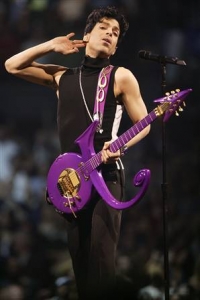
Prince Rogers Nelson (born 7 June 1958 in Minneapolis, Minnesota) is an American musician. He performs simply as Prince, but has also been known by various other names, among them an unpronounceable symbol, leading fans and critics to dub him The Artist Formerly Known As Prince or simply The Artist.
Prince is a prolific artist, having released several hundred songs both under his own name and with other artists. He has won six Grammy Awards and an Academy Award, and was inducted into the Rock and Roll Hall of Fame in 2004. In 2004, he was named as the top male pop artist of the past 25 years by ARC Rock on the Net, and Rolling Stone Magazine ranked Prince #28 on their list of the 100 Greatest Artists of All Time.
From his early material, rooted in R&B, soul and funk, Prince has expanded his musical palette throughout his career, absorbing many other genres including pop, rock, jazz, new wave, psychedelia and hip hop. Some of his primary influences include Sly Stone, Curtis Mayfield, Jimi Hendrix, Joni Mitchell, James Brown and Carlos Santana. The distinctive characteristics of his early-to-mid 1980s work, such as sparse and industrial-sounding drum machine arrangements and the use of synthesizer riffs to serve the role traditionally occupied by horn riffs in earlier R&B, funk and soul music, were called the "Minneapolis sound" and have proved very influential.
Prince is a prolific artist, having released several hundred songs both under his own name and with other artists. He has won six Grammy Awards and an Academy Award, and was inducted into the Rock and Roll Hall of Fame in 2004. In 2004, he was named as the top male pop artist of the past 25 years by ARC Rock on the Net, and Rolling Stone Magazine ranked Prince #28 on their list of the 100 Greatest Artists of All Time.
From his early material, rooted in R&B, soul and funk, Prince has expanded his musical palette throughout his career, absorbing many other genres including pop, rock, jazz, new wave, psychedelia and hip hop. Some of his primary influences include Sly Stone, Curtis Mayfield, Jimi Hendrix, Joni Mitchell, James Brown and Carlos Santana. The distinctive characteristics of his early-to-mid 1980s work, such as sparse and industrial-sounding drum machine arrangements and the use of synthesizer riffs to serve the role traditionally occupied by horn riffs in earlier R&B, funk and soul music, were called the "Minneapolis sound" and have proved very influential.
Charlie Parker
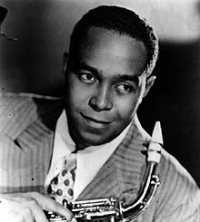
Charles Parker, Jr. (August 29, 1920 – March 12, 1955), famously called Bird or Yardbird, was an American jazz saxophonist and composer.
Parker, with Louis Armstrong and Duke Ellington, is widely considered to have been one of the most influential jazz musicians. Parker acquired the nickname "Yardbird" early in his career, and the shortened form "Bird" remained Parker's sobriquet for the rest of his life, inspiring the titles of a number of Parker compositions, such as "Yardbird Suite", "Ornithology" and "Bird of Paradise."
Parker played a leading role in the development of bebop, a form of jazz characterized by fast tempos, virtuoso technique, and improvisation based on harmonic structure. Parker's innovative approaches to melody, rhythm, and harmony exercised enormous influence on his contemporaries. Several of Parker's songs have become standards, including "Billie's Bounce", "Anthropology", "Ornithology", and "Confirmation". He introduced revolutionary harmonic ideas including a tonal vocabulary employing 9ths, 11ths and 13ths of chords, rapidly implied passing chords, and new variants of altered chords and chord substitutions. His tone was clean and penetrating, but sweet and plaintive on ballads. Although many Parker recordings demonstrate dazzling virtuosic technique and complex melodic lines – such as "Ko-Ko", "Kim", and "Leap Frog" – he was also one of the great blues players. His themeless blues improvisation "Parker's Mood" represents one of the most deeply affecting recordings in jazz. At various times, Parker fused jazz with other musical styles, from classical to Latin music, blazing paths followed later by others.
Parker, with Louis Armstrong and Duke Ellington, is widely considered to have been one of the most influential jazz musicians. Parker acquired the nickname "Yardbird" early in his career, and the shortened form "Bird" remained Parker's sobriquet for the rest of his life, inspiring the titles of a number of Parker compositions, such as "Yardbird Suite", "Ornithology" and "Bird of Paradise."
Parker played a leading role in the development of bebop, a form of jazz characterized by fast tempos, virtuoso technique, and improvisation based on harmonic structure. Parker's innovative approaches to melody, rhythm, and harmony exercised enormous influence on his contemporaries. Several of Parker's songs have become standards, including "Billie's Bounce", "Anthropology", "Ornithology", and "Confirmation". He introduced revolutionary harmonic ideas including a tonal vocabulary employing 9ths, 11ths and 13ths of chords, rapidly implied passing chords, and new variants of altered chords and chord substitutions. His tone was clean and penetrating, but sweet and plaintive on ballads. Although many Parker recordings demonstrate dazzling virtuosic technique and complex melodic lines – such as "Ko-Ko", "Kim", and "Leap Frog" – he was also one of the great blues players. His themeless blues improvisation "Parker's Mood" represents one of the most deeply affecting recordings in jazz. At various times, Parker fused jazz with other musical styles, from classical to Latin music, blazing paths followed later by others.
billy cobham
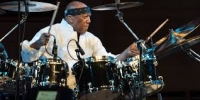
William Emanuel Cobham Jr. (born May 16, 1944) is a Panamanian-American jazz drummer who came to prominence in the late 1960s and early 1970s with trumpeter Miles Davis and then with the Mahavishnu Orchestra. According to AllMusic's reviewer, Cobham is "generally acclaimed as fusion's greatest drummer".
He was inducted into the Modern Drummer Hall of Fame in 1987 and the Classic Drummer Hall of Fame in 2013.
He was inducted into the Modern Drummer Hall of Fame in 1987 and the Classic Drummer Hall of Fame in 2013.
Wilson Pickett
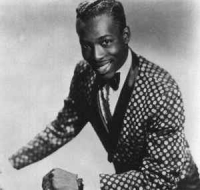
Wilson Pickett was an American singer and songwriter. A major figure in the development of American soul music, Pickett recorded over 50 songs which made the US R&B charts, many of which crossed over to the Billboard Hot 100
Emily Haines

Emily Savitri Haines is a Canadian singer and songwriter. She is the lead singer, keyboardist and songwriter of the rock band Metric and a member of Broken Social Scene. As a solo artist, she has performed under her own name and under the moniker Emily Haines & The Soft Skeleton.
Jazz Standard
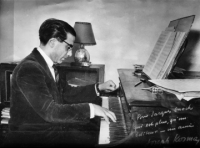
Autumn Leaves" is a popular song and jazz standard composed by Joseph Kosma with original lyrics by Jacques Prévert in French, and later by Johnny Mercer in English. An instrumental version by pianist Roger Williams was a #1 best-seller in the USA Billboard charts of 1955.
Dean Martin
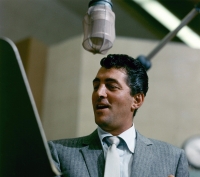
Dean Martin (born Dino Paul Crocetti; June 7, 1917 – December 25, 1995) was an American singer, film actor, television personality, and comedian. He was one of the most well known musical artists of the 1950s and 1960s. Martin's hit singles included the songs "Memories Are Made Of This", "That's Amore", "Everybody Loves Somebody", "Mambo Italiano", "Sway", "Volare" and "Ain't That A Kick In The Head?". One of the organizers of The Rat Pack, he was a major star in four areas of show business: concert stage, recordings, motion pictures, and television.
Astor Piazzola

Astor Pantaleón Piazzolla (Spanish pronunciation: , Italian pronunciation: ; March 11, 1921 – July 4, 1992) was an Argentine tango composer, bandoneon player, and arranger. His oeuvre revolutionized the traditional tango into a new style termed nuevo tango, incorporating elements from jazz and classical music. A virtuoso bandoneonist, he regularly performed his own compositions with a variety of ensembles.
In 1992, American music critic Stephen Holden described Piazzolla as "the world's foremost composer of tango music"
In 1992, American music critic Stephen Holden described Piazzolla as "the world's foremost composer of tango music"
Richard Sherman
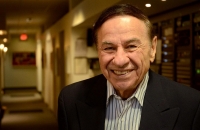
Richard Morton Sherman (born June 12, 1928) is an American songwriter who specialized in musical films with his brother Robert B. Sherman. According to the official Walt Disney Company website and independent fact checkers, "the Sherman Brothers were responsible for more motion picture musical song scores than any other songwriting team in film history."
Some of the Sherman Brothers' best known songs were incorporated into live action and animation musical films including: Mary Poppins, The Happiest Millionaire, The Jungle Book, The Many Adventures of Winnie the Pooh, Chitty Chitty Bang Bang, Snoopy Come Home, Bedknobs and Broomsticks, The Slipper and the Rose, and Charlotte's Web.
Some of the Sherman Brothers' best known songs were incorporated into live action and animation musical films including: Mary Poppins, The Happiest Millionaire, The Jungle Book, The Many Adventures of Winnie the Pooh, Chitty Chitty Bang Bang, Snoopy Come Home, Bedknobs and Broomsticks, The Slipper and the Rose, and Charlotte's Web.
Hiromi Uehara

Hiromi Uehara (上原ひろみ, born 26 March 1979), known as Hiromi, is a jazz composer and pianist born in Hamamatsu, Japan. She is known for her virtuosic technique, energetic live performances and blend of musical genres such as post-bop, progressive rock, classical and fusion in her compositions.
Whitesnake
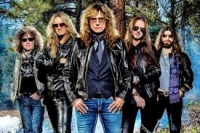
Whitesnake are an English hard rock band formed in 1978 by David Coverdale, after his departure from his previous band Deep Purple. Their early material has been compared by critics to the blues rock of Deep Purple, but they slowly began moving toward a more commercially accessible rock style. By the turn of the decade, the band's commercial fortunes changed and they released a string of UK top 10 albums, Ready an' Willing (1980), Come an' Get It (1981), Saints & Sinners (1982) and Slide It In (1984), the last of which was their first to chart in the US and is certified 2x platinum.
The band's 1987 self-titled album was their most commercially successful worldwide, and contained two major US hits, "Here I Go Again" and "Is This Love", reaching number one and two on the Billboard Hot 100. The album went 8 times platinum in the US, and the band's success saw them nominated for the 1988 Brit Award for Best British Group. Slip of the Tongue (1989), was also a success, reaching the top 10 in the UK and the US, and received a platinum US certification. The band split up shortly after this release, but had a reunion in 1994, and released a one-off studio album, Restless Heart (1997).
Whitesnake officially reformed in 2002 and have been touring together since, releasing three albums, Good to Be Bad (2008), Forevermore (2011) and The Purple Album (2015). In 2005, Whitesnake were named the 85th greatest hard rock band of all time by VH1.
The band's 1987 self-titled album was their most commercially successful worldwide, and contained two major US hits, "Here I Go Again" and "Is This Love", reaching number one and two on the Billboard Hot 100. The album went 8 times platinum in the US, and the band's success saw them nominated for the 1988 Brit Award for Best British Group. Slip of the Tongue (1989), was also a success, reaching the top 10 in the UK and the US, and received a platinum US certification. The band split up shortly after this release, but had a reunion in 1994, and released a one-off studio album, Restless Heart (1997).
Whitesnake officially reformed in 2002 and have been touring together since, releasing three albums, Good to Be Bad (2008), Forevermore (2011) and The Purple Album (2015). In 2005, Whitesnake were named the 85th greatest hard rock band of all time by VH1.
Victor Wooten
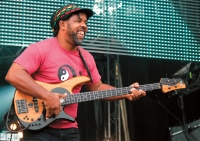
Victor Lemonte Wooten is an American bass virtuoso. He met the bass guitar when he was 2 years old, thanks to his brothers who were all musicians, and when he was 5 years old, he made his first concert with Wooten Brothers. He says he learned the instrument and speaking at the same time.
John Scofield
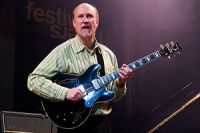
John Scofield (born December 26, 1951), sometimes referred to as "Sco", is an American jazz-rock guitarist and composer whose music includes bebop, jazz fusion, funk, blues, soul, and rock. He has worked with Miles Davis, Dave Liebman, Joe Henderson, Charles Mingus, Joey DeFrancesco, Herbie Hancock, Eddie Palmieri, Pat Metheny, Bill Frisell, Joe Lovano, Pat Martino, Mavis Staples, Phil Lesh, Billy Cobham, Medeski Martin & Wood, George Duke, Jaco Pastorius, John Mayer, Robert Glasper, and Gov't Mule.
Jeff Berlin
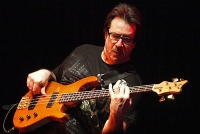
Jeffrey Arthur Berlin is an American jazz fusion bassist. He came to prominence in the 1970s as a member of the band Bruford led by drummer Bill Bruford.
Joni Mitchell

Joni Mitchell was born on November 7, 1943, in Fort Macleod, Canada. In 1968, she recorded her first, self-titled album. Other highly successful albums followed. Mitchell won her first Grammy Award (best folk performance) for her 1969 album, Clouds. She has won seven more Grammy Awards since then, in several different categories, including traditional pop, pop music and lifetime achievement.
Jaco Pastorius

John Francis Anthony "Jaco" Pastorius III was an American jazz bassist who was a member of Weather Report from 1976 to 1981. He worked with Pat Metheny and Joni Mitchell, and recorded albums as a solo artist and band leader. His bass playing employed funk, lyrical solos, bass chords, and innovative harmonics.
Rachmaninoff

Sergei Vasilievich Rachmaninoff (1 April 1873 - 28 March 1943) was a Russian composer, pianist, and conductor. He was one of the finest pianists of his day and, as a composer, the last great representative of Russian late Romanticism in classical music. Early influences of Tchaikovsky, Rimsky-Korsakov and other Russian composers gave way to a thoroughly personal idiom which included a pronounced lyricism, expressive breadth, structural ingenuity and a tonal palette of rich, distinctive orchestral colors.
Understandably, the piano figures prominently in Rachmaninoff's compositional output, either as a solo instrument or as part of an ensemble. He made it a point, however, to use his own skills as a performer to explore fully the expressive possibilities of the instrument. Even in his earliest works, he revealed a sure grasp of idiomatic piano writing and a striking gift for melody. In some of his early orchestral pieces he showed the first signs of a talent for tone painting, which he would perfect in The Isle of the Dead, and he began to show a similar penchant for vocal writing in two early sets of songs, Opp. 4 and 8. Rachmaninoff's masterpiece, however, is his choral symphony The Bells, in which all of his talents are fused and unified.
Rachmaninoff sometimes felt threatened by the success of modernists such as Scriabin and Prokofiev and wondered whether to cease composing even before he left Russia. His musical philosophy was rooted in the Russian spiritual tradition, where the role of the artist was to create beauty and to speak the truth from the depths of his heart. In his last major interview, in 1941, he admitted his music, like Russian music, was a product of his temperament. He said, on another occasion, "The new kind of music seems to create not from the heart but from the head. Its composers think rather than feel. They have not the capacity to make their works exalt—they meditate, protest, analyze, reason, calculate and brood, but they do not exalt."
Understandably, the piano figures prominently in Rachmaninoff's compositional output, either as a solo instrument or as part of an ensemble. He made it a point, however, to use his own skills as a performer to explore fully the expressive possibilities of the instrument. Even in his earliest works, he revealed a sure grasp of idiomatic piano writing and a striking gift for melody. In some of his early orchestral pieces he showed the first signs of a talent for tone painting, which he would perfect in The Isle of the Dead, and he began to show a similar penchant for vocal writing in two early sets of songs, Opp. 4 and 8. Rachmaninoff's masterpiece, however, is his choral symphony The Bells, in which all of his talents are fused and unified.
Rachmaninoff sometimes felt threatened by the success of modernists such as Scriabin and Prokofiev and wondered whether to cease composing even before he left Russia. His musical philosophy was rooted in the Russian spiritual tradition, where the role of the artist was to create beauty and to speak the truth from the depths of his heart. In his last major interview, in 1941, he admitted his music, like Russian music, was a product of his temperament. He said, on another occasion, "The new kind of music seems to create not from the heart but from the head. Its composers think rather than feel. They have not the capacity to make their works exalt—they meditate, protest, analyze, reason, calculate and brood, but they do not exalt."
Wagner

Wilhelm Richard Wagner (22 May 1813, Leipzig, Germany - 13 February 1883, Venice, Italy) was a German composer, conductor, theatre director and essayist, primarily known for his operas (or "music dramas", as they were later called). Unlike most other great opera composers, Wagner wrote both the scenario and libretto for his works.
Wagner's compositions, particularly those of his later period, are notable for contrapuntal texture, rich chromaticism, harmonies and orchestration, and elaborate use of leitmotifs: musical themes associated with particular characters, locales or plot elements. Wagner pioneered advances in musical language, such as extreme chromaticism and quickly shifting tonal centres, which greatly influenced the development of European classical music.
He transformed musical thought through his idea of Gesamtkunstwerk ("total artwork"), the synthesis of all the poetic, visual, musical and dramatic arts, epitomized by his monumental four-opera cycle Der Ring des Nibelungen (1876). To try to stage these works as he imagined them, Wagner built his own opera house.
Wagner's musical style is often considered the epitome of classical music's Romantic period, due to its unprecedented exploration of emotional expression. He introduced new ideas in harmony and musical form, including extreme chromaticism. In Tristan und Isolde, he explored the limits of the traditional tonal system that gave keys and chords their identity, pointing the way to atonality in the 20th century. Some music historians date the beginning of modern classical music to the first notes of Tristan, the so-called Tristan chord.
Wagner's compositions, particularly those of his later period, are notable for contrapuntal texture, rich chromaticism, harmonies and orchestration, and elaborate use of leitmotifs: musical themes associated with particular characters, locales or plot elements. Wagner pioneered advances in musical language, such as extreme chromaticism and quickly shifting tonal centres, which greatly influenced the development of European classical music.
He transformed musical thought through his idea of Gesamtkunstwerk ("total artwork"), the synthesis of all the poetic, visual, musical and dramatic arts, epitomized by his monumental four-opera cycle Der Ring des Nibelungen (1876). To try to stage these works as he imagined them, Wagner built his own opera house.
Wagner's musical style is often considered the epitome of classical music's Romantic period, due to its unprecedented exploration of emotional expression. He introduced new ideas in harmony and musical form, including extreme chromaticism. In Tristan und Isolde, he explored the limits of the traditional tonal system that gave keys and chords their identity, pointing the way to atonality in the 20th century. Some music historians date the beginning of modern classical music to the first notes of Tristan, the so-called Tristan chord.
pat metheny

Patrick Bruce "Pat" Metheny (/məˈθiːni/ mə-thee-nee; born August 12, 1954) is an American jazz guitarist and composer.
He is the leader of the Pat Metheny Group and is also involved in duets, solo works and other side projects. His style incorporates elements of progressive and contemporary jazz, post-bop, latin jazz and jazz fusion. Pat Metheny has three gold albums and 20 Grammy Awards. He is the brother of jazz flugelhornist and journalist Mike Metheny.
He is the leader of the Pat Metheny Group and is also involved in duets, solo works and other side projects. His style incorporates elements of progressive and contemporary jazz, post-bop, latin jazz and jazz fusion. Pat Metheny has three gold albums and 20 Grammy Awards. He is the brother of jazz flugelhornist and journalist Mike Metheny.
Saint Saens

Charles-Camille Saint-Saëns (9 October 1835 – 16 December 1921) was a French composer, organist, conductor, and pianist, known especially for The Carnival of the Animals, Danse Macabre, Samson and Delilah, Havanaise, Introduction and Rondo capriccioso, and his Symphony No. 3 (Organ Symphony).
Louis Armstrong

Louis Armstrong (4 August 1901 – July 6, 1971), nicknamed Satchmo or Sachimo and Pops, was an American jazz trumpeter and singer.
Coming to prominence in the 20s as an innovative cornet and trumpet virtuoso, Armstrong was a foundational influence on jazz, shifting the music's focus from collective improvisation to solo performers. With his distinctive gravelly voice, Armstrong was an influential singer, demonstrating great dexterity as an improviser, bending the lyrics and melody of a song for expressive purposes. He was also greatly skilled at scat singing, or wordless vocalizing.
Renowned for his charismatic stage presence, Armstrong's influence extended well beyond jazz, and by the end of his career in the '60s, he was widely regarded as a profound influence on popular music in general: critic Steve Leggett describes Armstrong as "perhaps the most important American musician of the 20th century."
Coming to prominence in the 20s as an innovative cornet and trumpet virtuoso, Armstrong was a foundational influence on jazz, shifting the music's focus from collective improvisation to solo performers. With his distinctive gravelly voice, Armstrong was an influential singer, demonstrating great dexterity as an improviser, bending the lyrics and melody of a song for expressive purposes. He was also greatly skilled at scat singing, or wordless vocalizing.
Renowned for his charismatic stage presence, Armstrong's influence extended well beyond jazz, and by the end of his career in the '60s, he was widely regarded as a profound influence on popular music in general: critic Steve Leggett describes Armstrong as "perhaps the most important American musician of the 20th century."
Jon Bon Jovi
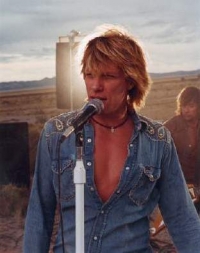
Jon Bon Jovi (born John Francis Bongiovi, Jr. on March 2, 1962) is an American musician, songwriter and actor. As lead singer and founder of the rock band Bon Jovi, he has sold just under 156 million albums worldwide (August 2008). He is also the owner of an Arena Football League team, the Philadelphia Soul.
In June 2007, Bon Jovi released their new tenth studio album, Lost Highway. The album debuted at number #1 on the Billboard charts, the first time that Bon Jovi have had a number one album on the US charts since the release of New Jersey in 1988. Thanks to the band's new country music fanbase, the album sold 292,000 copies in its first week on sale in the U.S., and became Bon Jovi's third US number one album. The first single from the new album was "(You Want to) Make a Memory", which debuted (and peaked) at #27 in the Billboard Hot 100, Bon Jovi's highest ever debut in the U.S. charts. The album reached Number #1 in Japan, Canada, Australia and Europe, and reached number #2 in the UK.
In June 2007, Bon Jovi released their new tenth studio album, Lost Highway. The album debuted at number #1 on the Billboard charts, the first time that Bon Jovi have had a number one album on the US charts since the release of New Jersey in 1988. Thanks to the band's new country music fanbase, the album sold 292,000 copies in its first week on sale in the U.S., and became Bon Jovi's third US number one album. The first single from the new album was "(You Want to) Make a Memory", which debuted (and peaked) at #27 in the Billboard Hot 100, Bon Jovi's highest ever debut in the U.S. charts. The album reached Number #1 in Japan, Canada, Australia and Europe, and reached number #2 in the UK.
Michael Jackson

Michael Joseph Jackson (August 29, 1958 – June 25, 2009) was an American singer, dancer and entertainer. Referred to as the King of Pop, he is the most commercially successful entertainer of all time, and one of the most influential. His contributions to music, dance and fashion, along with a much publicized personal life, made him a global figure in popular culture for over four decades.
Alongside his brothers, he made his debut as lead singer and youngest member of The Jackson 5 in 1964. He began his solo career in 1971. His 1982 album Thriller remains the best-selling album ever, with Off the Wall (1979), Bad (1987), Dangerous (1991) and HIStory (1995) also among the world's best-selling albums. He is widely credited with having transformed the music video from a promotional tool into an art form with videos for his songs such as "Billie Jean", "Beat It" and "Thriller" making him the first African American artist to amass a strong crossover following on MTV. With stage performances and music videos, Jackson popularized a number of physically complicated dance techniques, such as the robot and the moonwalk. His distinctive musical sound, vocal style, and choreography, is credited with stretching across and breaking down cultural, racial, economic, generational, and global barriers that has inspired countless pop, rock, R&B and hip hop artists.
One of the few artists to have been inducted into the Rock and Roll Hall of Fame twice, his other achievements feature multiple Guinness World Records—including the "Most Successful Entertainer of All Time"—15 Grammy Awards (including the "Living Legend Award" and the "Lifetime Achievement Award"), 26 American Music Awards (24 only as a solo artist, including one for "Artist of the Century")—more than any artist—, 17 number one singles in the US (including the four as a member of the Jackson 5), and estimated sales of up to 750 million records worldwide making him the world's best selling artist in history.
Jackson's personal relationships and life generated controversy for years. His changing appearance was noticed from the late 1970s onwards, with changes to his nose and to the color of his skin drawing media publicity. He was accused of child sexual abuse in 1993 though no charges were brought, and in 2005 he was tried and acquitted when the jury ruled him not guilty on all charges. He married twice, first in 1994 and again in 1996, and brought up three children, one born to a surrogate mother. While preparing for the This Is It concert tour in 2009, Jackson died at the age of 50 after suffering from cardiac arrest. He reportedly had been administered drugs such as propofol and lorazepam, and his death was ruled a homicide by the Los Angeles County coroner. His death triggered an outpouring of grief from around the world with his globally live broadcast memorial service attracting an audience of up to one billion people; as well as a huge surge in his album sales, resulting in him becoming the best selling artist of 2009 with sales in excess of 8.2 million in the United States where he became the first artist ever to have 4 of the top 20 best-selling albums in a single year, and 29 million albums globally, where he had an unprecedented 8 of the top 25 best-selling albums worldwide.
Alongside his brothers, he made his debut as lead singer and youngest member of The Jackson 5 in 1964. He began his solo career in 1971. His 1982 album Thriller remains the best-selling album ever, with Off the Wall (1979), Bad (1987), Dangerous (1991) and HIStory (1995) also among the world's best-selling albums. He is widely credited with having transformed the music video from a promotional tool into an art form with videos for his songs such as "Billie Jean", "Beat It" and "Thriller" making him the first African American artist to amass a strong crossover following on MTV. With stage performances and music videos, Jackson popularized a number of physically complicated dance techniques, such as the robot and the moonwalk. His distinctive musical sound, vocal style, and choreography, is credited with stretching across and breaking down cultural, racial, economic, generational, and global barriers that has inspired countless pop, rock, R&B and hip hop artists.
One of the few artists to have been inducted into the Rock and Roll Hall of Fame twice, his other achievements feature multiple Guinness World Records—including the "Most Successful Entertainer of All Time"—15 Grammy Awards (including the "Living Legend Award" and the "Lifetime Achievement Award"), 26 American Music Awards (24 only as a solo artist, including one for "Artist of the Century")—more than any artist—, 17 number one singles in the US (including the four as a member of the Jackson 5), and estimated sales of up to 750 million records worldwide making him the world's best selling artist in history.
Jackson's personal relationships and life generated controversy for years. His changing appearance was noticed from the late 1970s onwards, with changes to his nose and to the color of his skin drawing media publicity. He was accused of child sexual abuse in 1993 though no charges were brought, and in 2005 he was tried and acquitted when the jury ruled him not guilty on all charges. He married twice, first in 1994 and again in 1996, and brought up three children, one born to a surrogate mother. While preparing for the This Is It concert tour in 2009, Jackson died at the age of 50 after suffering from cardiac arrest. He reportedly had been administered drugs such as propofol and lorazepam, and his death was ruled a homicide by the Los Angeles County coroner. His death triggered an outpouring of grief from around the world with his globally live broadcast memorial service attracting an audience of up to one billion people; as well as a huge surge in his album sales, resulting in him becoming the best selling artist of 2009 with sales in excess of 8.2 million in the United States where he became the first artist ever to have 4 of the top 20 best-selling albums in a single year, and 29 million albums globally, where he had an unprecedented 8 of the top 25 best-selling albums worldwide.
Hillsong United

The Hillsong United band is an Australian rock and worship band, a part of Hillsong Church's youth ministry Hillsong United. Their music is a contemporary style of praise and worship tempered with mainstream rock.
Current members of the Hillsong United band include Jonathon Douglass (J.D.), Jadwin "Jad" Gillies, Holly Watson, Annie Garratt, Bec Gillies, and Michelle Fragar, daughter of Russell Fragar. Michael Guy Chislett plays guitar and Matthew Tennikoff plays bass guitar. Former original drummer Luke Munns made a transition from the drums to front the rock/indie band LUKAS. Popular New Zealand artist Brooke Fraser recently joined the band when she joined the church, first appearing on United We Stand.
The annual Hillsong United CD/DVD was recorded over many years during their October youth conference Encounterfest, with the album released in the first quarter of the following year. The 2007 album All of the Above was the first album to be fully studio recorded, containing videos of songs on the DVD. The band has toured in a number of countries, leading worship to thousands in North and South America, Europe and Asia.
Current members of the Hillsong United band include Jonathon Douglass (J.D.), Jadwin "Jad" Gillies, Holly Watson, Annie Garratt, Bec Gillies, and Michelle Fragar, daughter of Russell Fragar. Michael Guy Chislett plays guitar and Matthew Tennikoff plays bass guitar. Former original drummer Luke Munns made a transition from the drums to front the rock/indie band LUKAS. Popular New Zealand artist Brooke Fraser recently joined the band when she joined the church, first appearing on United We Stand.
The annual Hillsong United CD/DVD was recorded over many years during their October youth conference Encounterfest, with the album released in the first quarter of the following year. The 2007 album All of the Above was the first album to be fully studio recorded, containing videos of songs on the DVD. The band has toured in a number of countries, leading worship to thousands in North and South America, Europe and Asia.
J. S. Bach
Johann Sebastian Bach (21 March 1685, O.S.31 March 1685, N.S. – 28 July 1750, N.S.) was a German composer, organist, harpsichordist, violist, and violinist whose sacred and secular works for choir, orchestra, and solo instruments drew together the strands of the Baroque period and brought it to its ultimate maturity. Although he did not introduce new forms, he enriched the prevailing German style with a robust contrapuntal technique, an unrivalled control of harmonic and motivic organisation, and the adaptation of rhythms, forms and textures from abroad, particularly from Italy and France.
Revered for their intellectual depth, technical command and artistic beauty, Bach's works include the Brandenburg Concertos, the Goldberg Variations, the Partitas, The Well-Tempered Clavier, the Mass in B minor, the St Matthew Passion, the St John Passion, the Magnificat, A Musical Offering, The Art of Fugue, the English and French Suites, the Sonatas and Partitas for solo violin, the Cello Suites, more than 200 surviving cantatas, and a similar number of organ works, including the famous Toccata and Fugue in D minor and Passacaglia and Fugue in C minor, as well as the Great Eighteen Chorale Preludes and Organ Mass.
Bach's abilities as an organist were highly respected throughout Europe during his lifetime, although he was not widely recognised as a great composer until a revival of interest and performances of his music in the first half of the 19th century. He is now generally regarded as one of the main composers of the Baroque style, and as one of the greatest composers of all time.
Revered for their intellectual depth, technical command and artistic beauty, Bach's works include the Brandenburg Concertos, the Goldberg Variations, the Partitas, The Well-Tempered Clavier, the Mass in B minor, the St Matthew Passion, the St John Passion, the Magnificat, A Musical Offering, The Art of Fugue, the English and French Suites, the Sonatas and Partitas for solo violin, the Cello Suites, more than 200 surviving cantatas, and a similar number of organ works, including the famous Toccata and Fugue in D minor and Passacaglia and Fugue in C minor, as well as the Great Eighteen Chorale Preludes and Organ Mass.
Bach's abilities as an organist were highly respected throughout Europe during his lifetime, although he was not widely recognised as a great composer until a revival of interest and performances of his music in the first half of the 19th century. He is now generally regarded as one of the main composers of the Baroque style, and as one of the greatest composers of all time.
Neil Young

Neil Percival Young OM (born November 12, 1945, Toronto, Ontario) is a Canadian singer-songwriter, musician and film director.
Young's work is characterized by deeply personal lyrics, distinctive guitar work, and signature nasal tenor singing voice. Although he accompanies himself on several different instruments—including piano and harmonica—his style of claw-hammer acoustic guitar and often idiosyncratic soloing on electric guitar are the linchpins of a sometimes ragged, sometimes polished sound. Although Young has experimented widely with differing music styles, including swing, jazz, rockabilly, blues, and electronic music throughout a varied career, his best known work usually falls into either of two distinct styles: folk-esque acoustic rock (as heard in songs such as "Heart of Gold", "Harvest Moon" and "Old Man") and electric-charged hard rock (in songs like "Cinnamon Girl", "Rockin' in the Free World" and "Hey Hey, My My (Into the Black)"). In more recent years, Young has started to adopt elements from newer styles of music, such as industrial, alternative country and grunge, the latter of which was profoundly influenced by his own style of playing, causing some to confer on him the title of "the godfather of grunge".
Young has directed (or co-directed) a number of films using the pseudonym Bernard Shakey, including Journey Through the Past (1973), Rust Never Sleeps (1979), Human Highway (1982), and Greendale (2003).
He is also an outspoken advocate for environmental issues and small farmers, having co-founded in 1985 the benefit concert Farm Aid, and in 1986 helped found The Bridge School, and its annual supporting Bridge School Benefit concerts, together with his wife Pegi.
Young's work is characterized by deeply personal lyrics, distinctive guitar work, and signature nasal tenor singing voice. Although he accompanies himself on several different instruments—including piano and harmonica—his style of claw-hammer acoustic guitar and often idiosyncratic soloing on electric guitar are the linchpins of a sometimes ragged, sometimes polished sound. Although Young has experimented widely with differing music styles, including swing, jazz, rockabilly, blues, and electronic music throughout a varied career, his best known work usually falls into either of two distinct styles: folk-esque acoustic rock (as heard in songs such as "Heart of Gold", "Harvest Moon" and "Old Man") and electric-charged hard rock (in songs like "Cinnamon Girl", "Rockin' in the Free World" and "Hey Hey, My My (Into the Black)"). In more recent years, Young has started to adopt elements from newer styles of music, such as industrial, alternative country and grunge, the latter of which was profoundly influenced by his own style of playing, causing some to confer on him the title of "the godfather of grunge".
Young has directed (or co-directed) a number of films using the pseudonym Bernard Shakey, including Journey Through the Past (1973), Rust Never Sleeps (1979), Human Highway (1982), and Greendale (2003).
He is also an outspoken advocate for environmental issues and small farmers, having co-founded in 1985 the benefit concert Farm Aid, and in 1986 helped found The Bridge School, and its annual supporting Bridge School Benefit concerts, together with his wife Pegi.
Elton John

Sir Elton Hercules John CBE (born Reginald Kenneth Dwight on 25 March 1947) is an English pop/rock singer, composer and pianist.
In his four-decade career, John has been one of the dominant forces in rock and popular music, especially during the 1970s. He has sold over 200 million records, making him one of the most successful artists of all time. He has more than 50 Top 40 hits including seven consecutive No. 1 U.S. albums, 59 Top 40 singles, 16 Top 10, four No. 2 hits, and nine No. 1 hits. He has won five Grammy awards and one Academy Award. His success has had a profound impact on popular music and has contributed to the continued popularity of the piano in rock and roll. In 2004, Rolling Stone ranked him #49 on their list of the 100 greatest artists of all time.
Some of the characteristics of John's musical talent include an ability to quickly craft melodies for the lyrics of songwriting partner Bernie Taupin, his former rich tenor (now baritone) voice, his classical and gospel-influenced piano, the aggressive orchestral arrangements of Paul Buckmaster among others and the flamboyant fashions, outlandishly excessive eyeglasses, and on-stage showmanship, especially evident during the 1970s.
John was inducted into the Rock and Roll Hall of Fame in 1994. He has been heavily involved in the fight against AIDS since the late 1980s, and was knighted in 1998. He entered into a civil partnership with David Furnish on 21 December 2005 and continues to be a champion for LGBT social movements. On April 9, 2008, John held a benefit concert for Hillary Clinton's presidential campaign, raising $2.5 million.
In his four-decade career, John has been one of the dominant forces in rock and popular music, especially during the 1970s. He has sold over 200 million records, making him one of the most successful artists of all time. He has more than 50 Top 40 hits including seven consecutive No. 1 U.S. albums, 59 Top 40 singles, 16 Top 10, four No. 2 hits, and nine No. 1 hits. He has won five Grammy awards and one Academy Award. His success has had a profound impact on popular music and has contributed to the continued popularity of the piano in rock and roll. In 2004, Rolling Stone ranked him #49 on their list of the 100 greatest artists of all time.
Some of the characteristics of John's musical talent include an ability to quickly craft melodies for the lyrics of songwriting partner Bernie Taupin, his former rich tenor (now baritone) voice, his classical and gospel-influenced piano, the aggressive orchestral arrangements of Paul Buckmaster among others and the flamboyant fashions, outlandishly excessive eyeglasses, and on-stage showmanship, especially evident during the 1970s.
John was inducted into the Rock and Roll Hall of Fame in 1994. He has been heavily involved in the fight against AIDS since the late 1980s, and was knighted in 1998. He entered into a civil partnership with David Furnish on 21 December 2005 and continues to be a champion for LGBT social movements. On April 9, 2008, John held a benefit concert for Hillary Clinton's presidential campaign, raising $2.5 million.
Moloko

Moloko /məˈloʊkoʊ/ were an Irish-English electronic music duo formed in Sheffield, England, consisting of vocalist Róisín Murphy and producer Mark Brydon. Blending elements of trip hop, electronica, and dance music, they are best known for their UK top 10 singles "The Time Is Now" (2000) and "Familiar Feeling" (2003), as well as the 1999 Boris Dlugosch remix of "Sing It Back" which became an international hit.
The Police
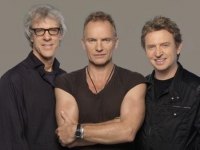
The Police were a three-piece rock band consisting of Sting (vocals, bass guitar), Andy Summers (guitar, vocals) and Stewart Copeland (drums, percussion, vocals). The band became globally popular in the early 1980s, playing a style of rock that was influenced by jazz, punk and reggae music. Their 1983 album, Synchronicity, was number one in the UK and the US and sold over 8,000,000 copies in the US. The band broke up in 1984, but reunited in early 2007 for a one-off world tour lasting until August 2008, in celebration of the 30th anniversary of their hit single "Roxanne" and also, to a lesser extent, that of their formation as a group. To date, The Police have sold more than 50 million albums worldwide. Rolling Stone ranked The Police number 70 on their list of the 100 Greatest Artists of All Time.
Alain Caron
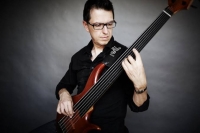
Alain Caron is a French Canadian jazz bassist. The youngest of 11 children, Caron started playing bass at the age of 11 and started to follow jazz at the age of 15. His musical skills were formalized by attending correspondence classes with jazz improvising teacher Charlie Banacos and attending a summer session at the Berklee School of Music.
Beatles

The Beatles were an English rock band formed in Liverpool in 1960. Their best-known lineup, consisting of John Lennon, Paul McCartney, George Harrison, and Ringo Starr, became the greatest and most influential act of the rock era, introducing more innovations into popular music than any other rock band of the 20th century. Rooted in skiffle and 1950s rock and roll, the Beatles later utilized several genres, ranging from pop ballads to psychedelic rock, often incorporating classical elements in innovative ways. In the early 1960s, their enormous popularity first emerged as "Beatlemania", but as their songwriting grew in sophistication, they came to be perceived by many fans and cultural observers as an embodiment of the ideals shared by the era's sociocultural revolutions.
The band built their reputation playing clubs in Liverpool and Hamburg over a three-year period from 1960. Manager Brian Epstein moulded them into a professional act and producer George Martin enhanced their musical potential. They gained popularity in the United Kingdom after their first modest hit, "Love Me Do", in late 1962. They acquired the nickname the "Fab Four" as Beatlemania grew in Britain over the following year, and by early 1964 they had become international stars, leading the "British Invasion" of the United States pop market. From 1965 on, the Beatles produced what many critics consider their finest material, including the innovative and widely influential albums Rubber Soul (1965), Revolver (1966), Sgt Pepper's Lonely Hearts Club Band (1967), The Beatles (1968), and Abbey Road (1969). After their break-up in 1970, they each enjoyed successful musical careers. Lennon was shot and killed in December 1980, and Harrison died of lung cancer in November 2001. McCartney and Starr remain musically active.
The band built their reputation playing clubs in Liverpool and Hamburg over a three-year period from 1960. Manager Brian Epstein moulded them into a professional act and producer George Martin enhanced their musical potential. They gained popularity in the United Kingdom after their first modest hit, "Love Me Do", in late 1962. They acquired the nickname the "Fab Four" as Beatlemania grew in Britain over the following year, and by early 1964 they had become international stars, leading the "British Invasion" of the United States pop market. From 1965 on, the Beatles produced what many critics consider their finest material, including the innovative and widely influential albums Rubber Soul (1965), Revolver (1966), Sgt Pepper's Lonely Hearts Club Band (1967), The Beatles (1968), and Abbey Road (1969). After their break-up in 1970, they each enjoyed successful musical careers. Lennon was shot and killed in December 1980, and Harrison died of lung cancer in November 2001. McCartney and Starr remain musically active.
Clifford Brown
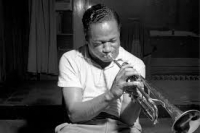
Clifford Brown, American jazz trumpeter. In 1953 he entered the Lionel Hampton orchestra. In 1954, together with drummer Max Roach, he formed a quintet that quickly became famous. It has established itself with its powerful work, richness of inventions and beautiful timbre. His style is a transition between "bop" and "cool".
 Sheet Music Network is a site for those who wants to access popular sheet music easily,
letting them download the sheet music for free for trial purposes.
It's completely free to download and try the listed sheet music, but you have to delete the files after 24 hours of trial.
Don't forget, if you like the piece of music you have just learned playing,
treat the artist with respect, and go buy the original sheet music.
Sheet Music Network is a site for those who wants to access popular sheet music easily,
letting them download the sheet music for free for trial purposes.
It's completely free to download and try the listed sheet music, but you have to delete the files after 24 hours of trial.
Don't forget, if you like the piece of music you have just learned playing,
treat the artist with respect, and go buy the original sheet music.
